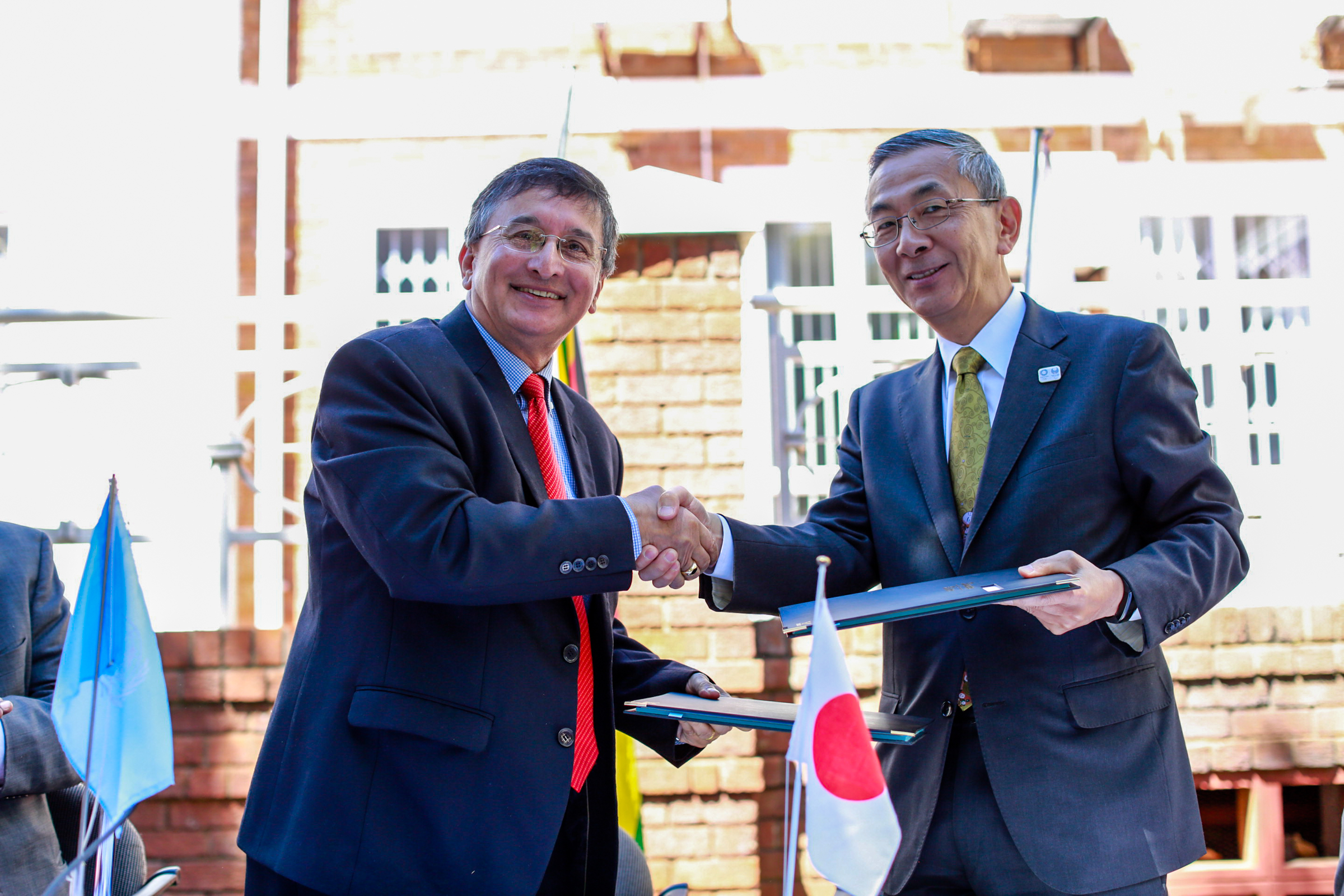By Byron Mutingwende
Indeed, free and fair elections are the cornerstone of democratic societies. In the same spirit, ahead of the 2018 elections in Zimbabwe, the Government of Japan, through the Project for Supporting Fair and Transparent Elections is contributing USD 1 million to the Zimbabwe Electoral Commission Capacity Building (ZIM-ECO) initiative implemented by the United Nations Development Programme (UNDP).
The Exchange of Notes for the Grant Aid was signed on 6 September 2017 by the United Nations Resident Coordinator (UNDP) Resident Representative Mr Bishow Parajuli and His Excellency, Ambassador Toshiyuki Iwado of Japan at the UN Office in Harare.
The support will be channelled towards the voter education campaigns and strengthening of the ICT capacity of the Zimbabwe Electoral Commission (ZEC) to support the voter registration process, both of which have the objective to promote citizen participation in the electoral process. It will also enhance the capacity of ZEC and the Zimbabwe Human Rights Commission to mitigate electoral-related violence. In addition, gender mainstreaming in the electoral process is a key project component.
The grant from the Government of Japan increases the resources available for electoral support to ZEC and complements the important financial support from the Government of Zimbabwe, and that of other development partners such as the European Union and UNDP.
Expressing gratitude to the Government of Japan for the contribution, the UN Resident Coordinator / UNDP Resident Representative Mr Bishow Parajuli highlighted the importance of this timely support to strengthen the democratic institutions in Zimbabwe in meeting their constitutional mandate. “UNDP, in collaboration with other development partners, remains committed to provide technical and financial support to ZEC as may be required in preparation for the 2018 elections and beyond” said Mr Parajuli.
The Ambassador of Japan to Zimbabwe, His Excellency Ambassador Toshiyuki Iwado described the elections as a cornerstone of democracy and an important milestone for the country.
“The elections provide all Zimbabweans with the opportunity to exercise their sovereign right to choose their representatives for the years to come. As such the electoral process has to be free, fair, transparent, and inclusive,” the Ambassador said.
Thanking the Government and people of Japan for their support to the Zimbabwe Electoral Commission (ZEC) Commissioner Emmanuel Magade, the ZEC Deputy Chairperson stated that his organisation was committed to conducting elections that are free, fair, transparent and verifiable. “Ultimately, our desire is to ensure that the outcome of elections represent the will of the people of Zimbabwe” he stressed.
Meanwhile, with Zimbabwe set to undergo elections in 2018, the Media Alliance of Zimbabwe (MAZ) is holding its annual media stakeholders’ conference in Harare to strategically prepare the media for the plebiscite under the theme “Strengthening the media’s role in fostering free, fair and peaceful elections in Zimbabwe and beyond” and will reflect on some of the interventions and gaps in working towards that objective.
In his keynote address at the MAZ conference, Dr. Ibbo Mandaza, a Zimbabwean academic, author and publisher, alluded to the recent Kenyan election and said observers and the media needed time to understand all the electoral processes so as to contribute to ensuring free and fair elections.

“The media and election observers should understand the nerves of electoral processes. These include voter registration, delimitation, printing of ballot papers, monitoring of the election day and the counting of votes. In all this, it’s important to assess whether holding elections is necessary and whether the conditions for free and fair elections are in place,” Mandaza said.
Mandaza urged the media to educate citizens on the nature and content of politics to the electorate. He bemoaned the capture of the media by politicians across the political divide as a poison that could lead to churning of concocted information that may prevent the holding of free and fair elections. His sentiments were echoed by Reuben Barwe, the Chief Correspondent of the Zimbabwe Broadcasting Corporation (ZBC) who highlighted the polarisation of both the private and public media during elections.
In her analysis of past Zimbabwean elections, Patience Zirima, the Director and Chairperson of MAZ said the polarised and partisan coverage of elections by the media was a cause of concern.
“International observers generally noted polarised and partisan coverage of elections by the media. The Electoral Commissions Forum of SADC countries observed that despite there being a media monitoring committee chaired by ZEC, coverage given to political parties and their candidates was done in an openly partisan manner by both the public and private media. Public print and electronic media predominantly gave coverage to the activities, rallies and views of candidates from Zanu (PF). The private media on the other hand was generally biased and sympathetic towards the opposition. The conclusion was that there was no equality, equity or fairness. The AU election Observer Mission noted the same issues but expressed concern that the national broadcaster only provided large, in depth coverage to one political party.
“While ZEC noted the bias, and unfair coverage during the election, the Commission still stated in its election report that, “there was general compliance with the relevant laws that govern media by both public and private media during the election period.” The argument was because they were both so polarized and biased, the cancelled each other out, providing some “balance” in reporting,” Zirima said.
Journalists Maggie Mzumara and Tapfuma Machakaire said the unprofessional and unethical conduct of the media on election reporting flout the principles of fairness, accuracy and balance which should be their hallmark in promoting free and fair elections.






